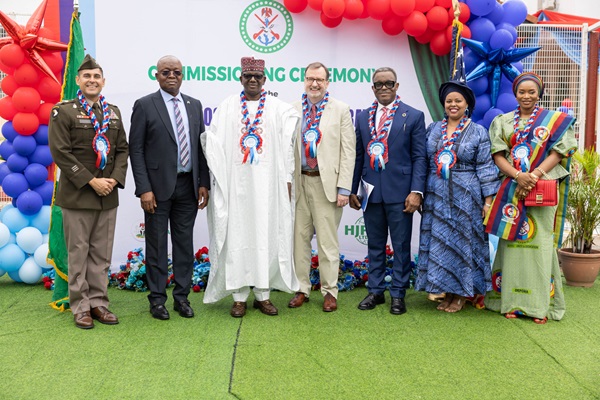
In a significant leap for Nigeria’s public health infrastructure, the TB Modular Laboratory at the Defense Reference Laboratory in Mogadishu Cantonment, Abuja, was officially commissioned on August 20, 2024.
This state-of-the-art facility marks a pivotal moment in Nigeria’s battle against tuberculosis (TB), further cementing the ongoing collaboration between Nigeria and the United States in advancing health outcomes nationwide. The fully certified laboratory, recognised by the Walter Reed Army Institute of Research in June 2024, enhances the capabilities of Nigeria’s National TB and Leprosy Programme.
The laboratory was officially inaugurated by Minister of State for Defense, Dr. Bello Mutawalle, with U.S. Ambassador to Nigeria Richard Mills, Commander of the Walter Reed Army Institute of Research (WRAIR), Colonel Eli Lozano; Director-general of the Nigerian Ministry of Defence Health Implementation Programme, Brig. Gen. NAE Okeji (Rtd); Permanent Secretary of the Nigerian Ministry of Defense, Dr. Ibrahim Abubakar Kana, among other prominent health and defense leaders, in attendance.
Equipped with advanced molecular diagnostic tools, including line probe assays and drug sensitivity testing (DST), the laboratory is designed to detect drug-resistant TB strains. By expanding TB case detection and integrating HIV and TB diagnostic services, it significantly improves access to life-saving diagnostics for both military personnel and civilian populations. This new facility represents a critical enhancement in Nigeria’s ability to combat infectious diseases, particularly TB.
The commissioning of the TB Modular Laboratory is the latest milestone in the long-standing partnership between the Nigerian Ministry of Defense Health Implementation Programme (MODHIP) and the Walter Reed Army Institute of Research Africa (WRAIR Africa). Established 19 years ago, this collaboration initially focused on providing HIV prevention, care and treatment services to military personnel, their families, and civilians in nearby communities. Over the years, the partnership has expanded to include TB, malaria, clinical research and vaccine trials, addressing both emerging and re-emerging infectious diseases in Nigeria.
Ambassador Mills highlighted the importance of this partnership, stating that the U.S. government’s investment in Nigeria’s health sector reflects the country’s significant stature on the continent. He noted that Nigeria is home to the largest American government health programming budget worldwide. Mills emphasised that the substantial investment, made possible by the generosity of the American people, allows the U.S. to provide crucial funding and technical assistance across a wide range of health priorities in Nigeria.
The commissioning of the TB Modular Laboratory underscores the enduring strength of the U.S.-Nigeria partnership. This collaboration has been instrumental in enhancing the standard of medical services provided in military health facilities across Nigeria. Through cutting-edge technology and rigorous research, the MODHIP-WRAIR Africa partnership continues to advance Nigeria’s capacity to combat infectious diseases and improve public health outcomes.
As Nigeria continues to face challenges in the fight against TB and other infectious diseases, the TB Modular Laboratory is poised to play a critical role in ensuring accurate diagnoses, ultimately saving lives and strengthening the country’s public health response. The laboratory’s capabilities will also support Nigeria’s broader efforts to combat TB, particularly in the context of the global fight against drug-resistant strains of the disease.
Expressing gratitude to all collaborators involved in the building, equipping and certification of the new laboratory, the country director of the WRAIR Africa programme in Nigeria Helina Meri noted that the greatest achievement would be the laboratory’s full utilisation in combating TB. She emphasised that the facility’s success will be measured by its impact on both military and civilian populations, ensuring they receive the highest standards of care in Nigeria.


